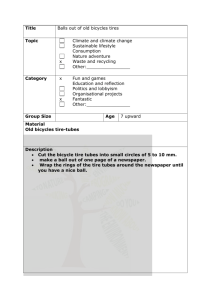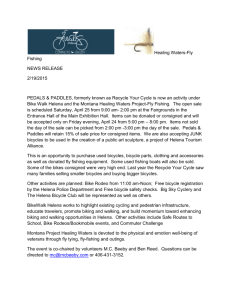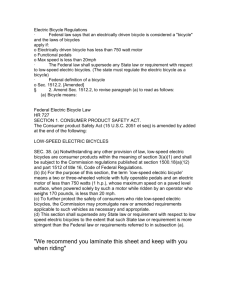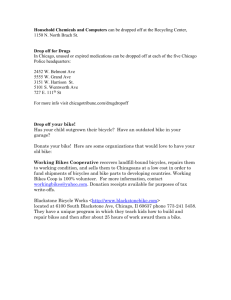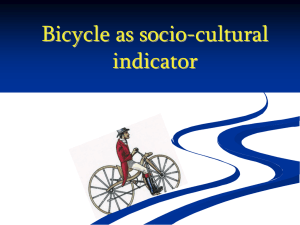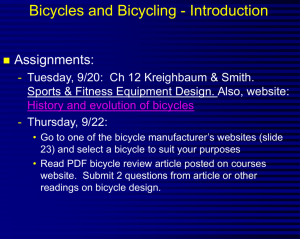Pilot Staff Bike Share Project Induction Notes www.capetown.gov.za/travelsmart
advertisement
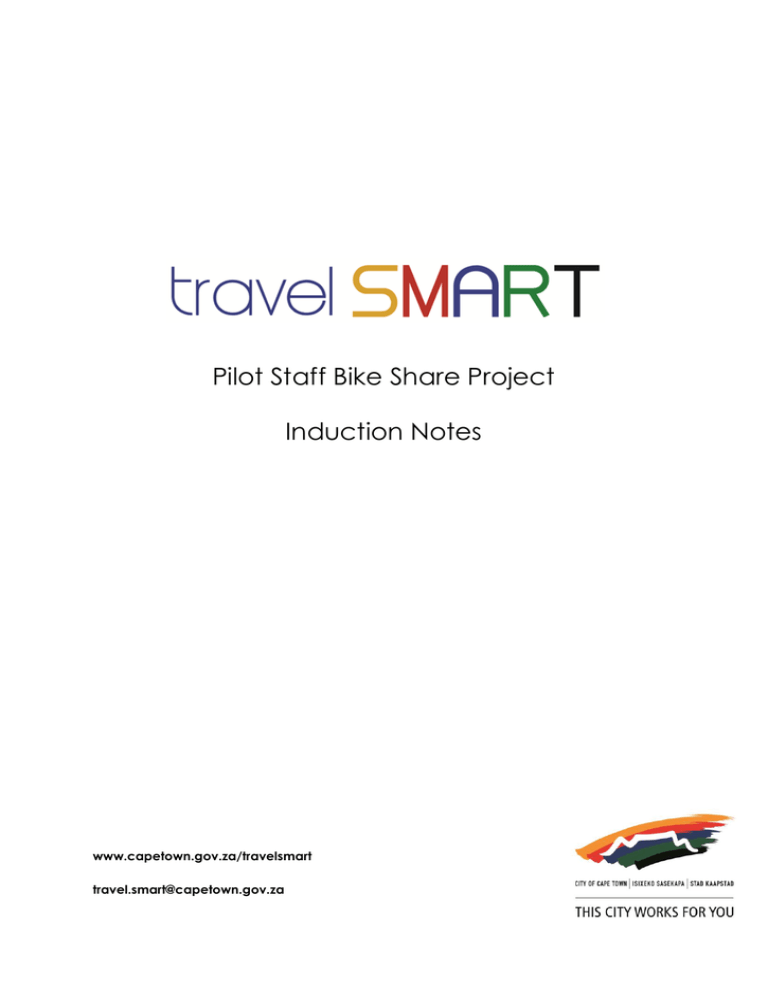
Pilot Staff Bike Share Project Induction Notes www.capetown.gov.za/travelsmart travel.smart@capetown.gov.za Contents Contents………………………………………………………………………...... i Introduction………………………………………………………...……………. 1 How do I get access to the bicycles?..................................................... 1 Location of the bicycles………………………………………………………. 3 The bicycles……………………………………………………………………… 4 Route guidance…………………………………………………………………. 5 Rules of the road for cyclists………………………………………………….. 6 Additional safety information………………………………………………... 7 Accident/incident procedures………………………………………………. 8 i Introduction Efficient, sustainable and cost-effective transport for local work trips This induction is intended to provide participants with an overview of the Pilot Staff Bike Share Project. It also provides critical safety advice for those who wish to use the bikes. The Bike Share Project forms part of the Travel SMART programme which promotes the use of sustainable modes of transport. You can find more information about the Travel SMART programme by visiting the website on www.capetown.gov.za/travelsmart. Staff at the Civic Centre and at 44 Wale Street have been provided with free access to bicycles which can be used to attend meetings or conduct site visits in and around the Central Business District (CBD) of Cape Town. City staff at these two buildings now have the option of travelling in a more sustainable, efficient and cost-effective way. This has a number of benefits including: Reducing private vehicle trips and congestion in the CBD; Reducing local air pollution and greenhouse gas emissions; Reducing petrol and parking costs; Improving individual health and well-being; and Helping to build a cycling culture in the Cape Town CBD. Overall, choosing to use a bicycle instead of driving will help to create a more efficient and sustainable Cape Town. For further information about the benefits of cycling, please visit the Travel SMART website. How to get access to the bikes? Before staff can use the bikes they must comply with the following requirements: Bicycles may only be used for official city business Read this induction material, sign the once-off registration form and email it to travel.smart@capetown.gov.za; Be aware of the rules of the road, including those that apply specifically to bicycles; and Be sufficiently healthy, fit and proficient to be able to cycle in the CBD: 1 - If you do not feel confident enough to cycle in the city centre then please do not do so. Alternatively, you may wish to cycle on the designated non-motorised transport facilities in the CBD. - If you have any doubts about your health please seek medical advice prior to participating in the project. To access a bicycle the following procedure should be followed: Staff should call or email the Bike Share Office in their building (details below) to check the availability of the bicycles. If a bicycle is available it can then be booked. Please return the bicycle on time because another person may be waiting for it. Staff can then collect a key for the bicycle lock from the relevant office. Remember to ALWAYS wear a helmet and to lock the bicycle when you reach your destination. When you are finished with the bicycle please lock it in its original position and return the key to relevant office. 2 Building Civic Centre Telephone Email address 021 400 9327 Nondumiso.Jali@capetown.gov.za 021 400 9991 Yolanda.Solomons@capetown.gov.za 021 400 4502 44 Wale Street Key Collection Point 2nd Floor Parking Office Foyer A Civic Centre Ismail.Mallum@capetown.gov.za 021 487 2350 Mark.Carelse@capetown.gov.za 021 487 2284 Sumaya.Ismail@capetown.gov.za 021 487 2468 Lydia.Mashonga@capetown.gov.za 7th Floor ERMD Reception 44 Wale Street Location of the bicycles Civic Centre The bicycles are located on the ground floor underground parking area, opposite the security office at the parking entrance off Old Marine Drive. 44 Wale Street The bicycles are located on the ground floor underground parking area. The access to this area is from Wale Street. 3 The bicycles A total of 8 bicycles are available to staff. 5 bicycles are available at the Civic Centre and 3 bicycles are available at 44 Wale Street. The bicycles are known as OV Fiets. They are imported from the Netherlands and are easy to use, single speed commuter bicycles. The bike uses a ‘back-pedal’ brake; however, a ‘normal’ brake has also been installed. If you have not used a ‘back-pedal’ braking system before please practice in a safe space before venturing out into the CBD. In addition: Helmets and reflective jackets are available for members of staff. You can adjust the saddle before beginning your journey. A bicycle tyre pump will be available to inflate the tyres if required. If you detect any faults with the bicycles please inform the Bike Share Office in your building. OV Fiets 4 Route Guidance If you are travelling between the Civic Centre and 44 Wale Street, or vice versa, then you may wish to use the route illustrated below. Please note that this route crosses Strand Street at the intersection of Strand and Plein and makes use of the bicycle lane on Adderley Street. 5 Rules of the road for cyclists It is essential for all bike share project participants to be aware of the rules of the road. This section provides an overview of the relevant rules of road for cyclists. According to South African traffic laws, bicycles are regarded as vehicles, which mean you have every right to be on the road. Along with dedicated bicycle paths and lanes, you may therefore ride on any road open to cycling. This excludes freeways (like the M3, M5, N1 and N2) in and near Cape Town, and all roads which indicate they are closed to bicycles. Use cycle lanes wherever these exist. As bicycles are regarded as vehicles there are rules which cyclists must obey in terms of the National Traffic Act 93 of 1996 and the National Road Traffic Regulations: 1. Riding without a helmet is illegal. 2. Always stop at all red traffic lights and all stop streets, and give way to pedestrians. 3. The law says you must ride on the left of the road. However this does not mean the edge of the road – ride a safe distance from the edge to avoid glass, cats’ eyes, manhole covers and drains. 4. You must be seated in your saddle. 5. You must ride in single file. 6. You may not deliberately swerve your bicycle from side to side. 7. If you are riding on a public road where there is a bicycle lane, you must use that lane. 6 Additional safety advice Before your departure Avoid cycling if you feel unwell. Make sure you’re wearing suitable clothing. Be aware of the weather – windy/wet weather can make cycling a challenge. If it is hot take a bottle of water with you. Wear a helmet – it is the law! Try to wear bright clothing; reflective jackets are available from the Bike Share Office. Check the bicycle before leaving. Make sure the tyres are inflated and that the brakes work. A bicycle tyre pump is available from the Bike Share Office. If necessary, adjust the saddle to the correct height. While you are cycling Always lock the bicycle when it is left unattended, the cable should pass through the frame, the front wheel and a secure object such as a bike rack, street pole or tree. Obey the traffic rules (see page 5). Watch out for other road users at intersections and stops. Ride defensively but decisively. Indicate your intentions, and check that the driver has seen you. Do not ride in the gutter or close to parked cars. Do not use an iPod or cell phone while riding. Always carry identification with you. When you have finished cycling Always return the bicycle to its original location when you finished cycling. Report any problems with the bicycles to the Bike Share Office. Watch out for the following Be aware of drivers opening their car doors. Drain covers that run in the same direction as your direction of travel. Glass, sand, water, oil spills and wet paint. Vehicles that are turning left and drivers who may not see you approaching in their blind spots. Passengers alighting from public transport. The draft from a passing bus or truck. 7 Accident/incident procedures If you experience a problem while cycling (e.g. puncture, brake failure) please return on foot to either the Civic Centre or 44 Wale Street. Alternatively, lock the bicycle in a secure location and immediately inform the Bike Share Office of the problem and the location of the bicycle. Please use the following advice in the event of an accident: Make the accident/incident scene as safe as possible. If you have been injured then seek medical treatment as quickly as possible. If other people were injured in the accident/incident then ask their name and assist them in seeking medical treatment. If you are able to give First Aid yourself, then please do so. Confirm your location and contact emergency services if required on 107 (land line) or 021 480 7700 (cell phone). Obtain the details of any witnesses or others who were involved in the accident. City of Cape Town staff are covered by Compensation for Occupational Health Injuries and Diseases (COID), provided the respective staff member is on duty at the time of the accident/incident. In the event of an accident/incident on duty please call Occupational Health and Safety on 021 400 3434. You should report traffic accidents to the SA Police Service within 24 hours; the Cape Town Central Station can be contacted on 021 467 8078. Should you have any further enquiries please contact: Project Administrator: Sivuyile Jokazi Contact (Tel): 021 400 4727 Contact (email): travel.smart@capetown.gov.za 8
